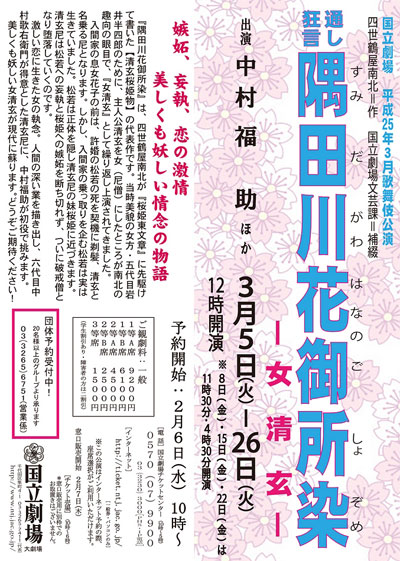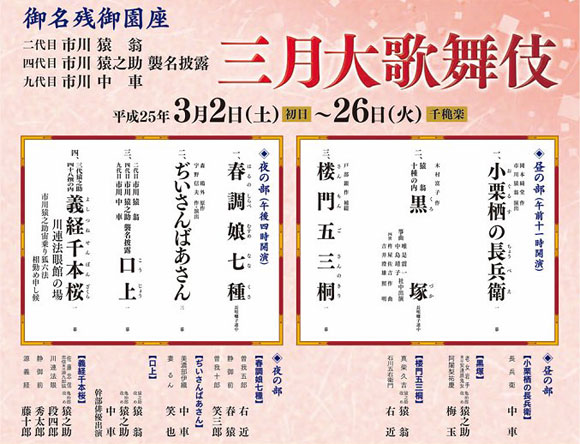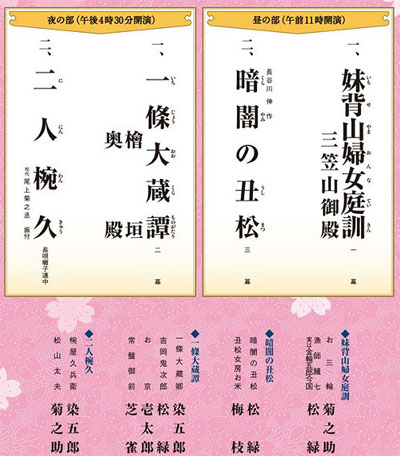| Comments |
Ichikawa En'˘ II, Ichikawa Ennosuke IV and Ichikawa Chűsha IX
celebrate their shűmei in Nagoya at the Misonoza!
Ogurusu no Ch˘bŕ: a modern comedy by Okamoto Kid˘ (1872~1939) about a famous historical
event. The village of Ogurusu is famous as the place where Akechi Mitsuhide
met his death. Mitsuhide assassinated his master, the warlord Nobunaga,
but after only three days of ruling Japan, was killed himself, passing
control to Hideyoshi. The farmer Ch˘bŕ (Ichikawa Chűsha) is the bad boy of the village and the object
of everyone's laughter and contempt, until a samurai comes and hails Ch˘bŕ
as a hero for killing Mitsuhide.
Kurozuka: a woman has grown bitter at the world after being rejected
by her husband and now loves in seclusion, killing travelers and becoming a kind of
demon. However, when she gives shelter to a holy man and his party,
she rejoices at this opportunity to find salvation. She goes to get firewood to
keep her visitors warm, cautioning them not to look into the back room, where
the bodies of her victims are. She dances in joy among the dry autumn grasses
under the full moon at her chance for absolution. But the porter in the holy man's
party looks in the back room and they all leave in a panic.
The old woman is furious at being betrayed and this transforms her into a demon,
which is finally vanquished by the power of the holy man.
Starring Ichikawa Ennosuke as the old woman and Nakamura Baigyoku as the holy man.
Sanmon: though short, this play is one of the most visually spectacular
in Kabuki. The famous villain Ishikawa Goemon (Ichikawa Ukon) enjoys a sea of cherry blossoms
while sitting on top the large gate of Nanzenji Temple. His enjoyment of the scene
is cut short, though, by the appearance below of his arch-nemesis, the general
Mashiba Hisayoshi (Ichikawa En'˘).
Musume Nanakusa: in the Edo period, every New Year,
plays appeared about the medieval vendetta carried out by the Soga brothers
Jűr˘ and Gor˘. This colorful, old-fashioned dance mixes this tradition with
that of eating porridge containing seven auspicious herbs on the seventh
day of the new year. As the brothers Jűr˘ (Ichikawa Emisabur˘) and Gor˘ (Ichikawa Ukon)
prepare to face their father's murderer and take revenge, along with beautiful
Shizuka Gozen (Ichikawa Shun'en), they cut the herbs, as a symbolic act of vengeance.
Jiisan Baasan: based on a short story by Mori ďgai, this modern play
by Uno Nobuo shows a loving young couple. The samurai Iori travels to Ky˘to with
his lord, leaving Run, his beloved wife, behind. While there, he attacks another
man in a fight over a sword and is forced into house arrest, separating him from
his wife. Many years later, he returns to his home as an old man.
There he meets an elderly woman and they do not recognize each other
until she sees the one thing that has not changed with age,
Iori's peculiar habit of putting his hand to his nose.
Starring Ichikawa Chűsha and Ichikawa Emiya as Iori and Run.
K˘j˘: the close relationship between the actors and the audience
is shown by these stage announcements, lavish ceremonies to commemorate various
important events. In this case, all the stars of the cast assemble to celebrate the shűmei of Ichikawa En'˘ II and Ichikawa Ennosuke IV
and Ichikawa Chűsha IX in Nagoya at the Misonoza.
Kawatsura H˘gen Yakata: the epic "Yoshitsune and the Thousand Cherry Trees" ("Yoshitsune Senbon Zakura")
features many characters around the famous general Yoshitsune, but none more
memorable than a magic fox that takes the guise of Tadanobu, one of Yoshitsune's
most trusted retainers. The fox wants to get close to a precious drum that Yoshitsune has made from the skins of his fox parents. In this excerpt
from the longer play, the fox reveals his true identity with a series
of spectacular stage tricks and Yoshitsune is moved to grant him the drum.
This play ends with a spectacular chűnori.
Starring Ichikawa Ennosuke as the fox Tadanobu.
Featuring also Living National Treasure Sakata T˘jűr˘ (Yoshitsune), Kataoka Hidetar˘ (Shizuka Gozen) and Ichikawa Danshir˘ (Kawatsura H˘gen).
Sources: Earphone Guide Website or Sh˘chiku Kabuki Official Website
|




